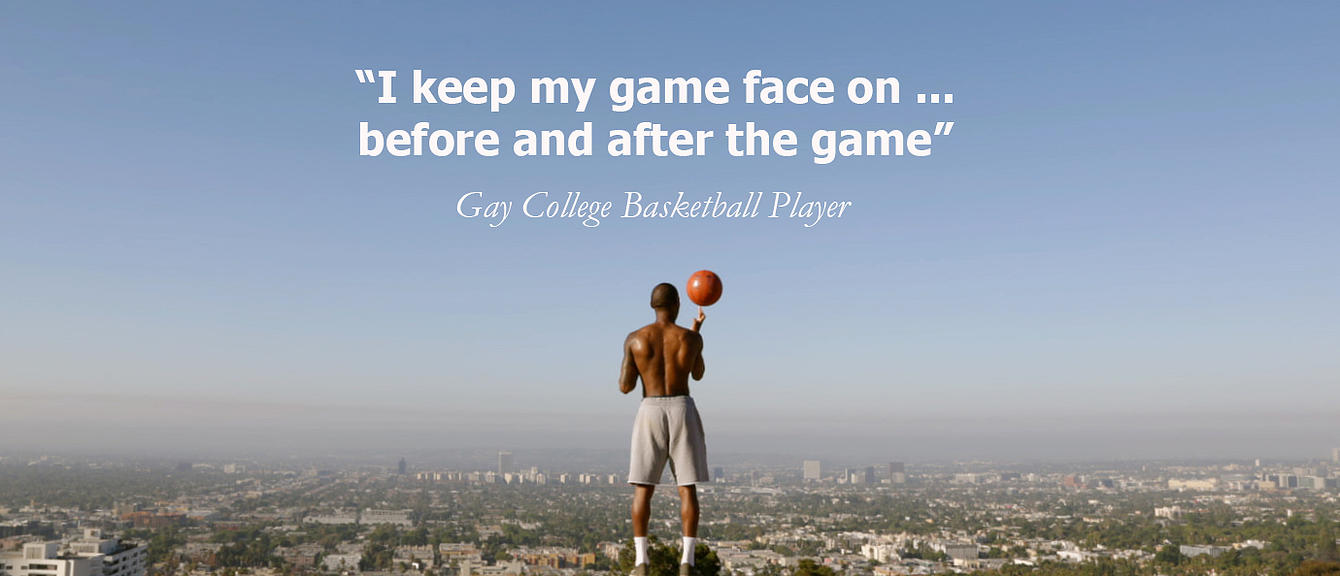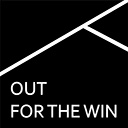
Why did you make a documentary about LGBTQI athletes in sport?
A combination of circumstances: I am gay myself and have an enormous passion for sports and basketball. It has taken me many years to accept that it is okay to be LGBTQI and be passionate about sport at the same time. Fortunately, I did not experience any problems during my coming out. But in the US I have friends who lost their scholarship because they are gay and I had a friend who even committed suicide, partly because he was not accepted. All of these elements prompted me to make a film to provide information on this important social theme.
How long have you been preparing for the film? What were the biggest obstacles to make the documentary?
The preparation of the film took about half a year and eventually I followed Terrence and Fallon for two years. The biggest obstacle was finding sponsors. In the beginning, I invested my own money, but I was lucky to find enough financiers eventually.
How did you find the athletes? Were they ready to work with you right away? Did you wish you could have followed more athletes?
I have known Terrence for a couple of years because we have some common friends and we also regularly played basketball in Los Angeles. It took me 4 months to convince him. I did not know Fallon at that time. Kye Allums, the first open-minded transgender college basketball player, introduced me to Fallon. I still think it’s really nice that she trusted me so fast, despite not knowing each other! I wanted to limit myself to two athletes so that I could follow them thoroughly enough. I tried to involve as many other athletes in their storylines, such as Jason Collins, Chris Mosier, Kye Allums, and Wade Davis.
Did you specifically search for American athletes or was there a reason why your documentary was filmed in the U.S.?
I was open to follow athletes anywhere in the world, but eventually, I found Fallon and Terrence in the U.S. With them, I literally crossed all corners of America, giving viewers a wide range of footage.
Why did you focus both on a gay athlete and on a transgender athlete?
Everyone’s coming-out process is different, and there are differences between a gay person and a transgender person, but at the same time there are also many common features. That diversity, but also similarities, make it perfect for both Terrence and Fallon to make a parallel story.
Did unexpected twists happened in the life of the two athletes that made the documentary different than previously planned?
I constantly had to update my scenario. Fallon’s coming out happened from one day to another, and despite her being the favourite, she lost the final. For Terrence, I once flew to Oklahoma because he wanted to get out of the closet, but when I landed he had already changed his mind. Such changes were constantly taking place.

Michiel Thomas (middle), with Terrence Clemens (left) en Fallon Fox (right)
What do you find most striking about your documentary?
That we managed to realize this film. Fallon, Terrence, the crew and I had no idea how, what, when and where this doc would end. It has cost blood, sweat and tears to make this dream come true.
Was there anything you still wanted to show but didn’t work out?
I have enough material to assemble three sequels… It was difficult to switch between all the captivating images and interviews, but I had to deliver a product around 90 minutes.
Suddenly your movie is on Netflix and can be seen in over 190 countries, what went through your mind?
When I got the call, I ran up the street like a wild man. I was overjoyed and really happy. There is still a lot of trans and homophobia in the world, so I’m glad that people all over the world have access to this movie and can learn about this subject.
You also won a lot of prizes, but what was the most beautiful response or review about Game Face?
The most beautiful responses are the emails of young people who said that this movie saved their life because they were on the verge of suicide… Also there was a boy who had seen Game Face with his parents and came out to them after the movie. Such reactions are unforgettable… That’s why you’re doing it!
Did you also receive mean or negative responses afterwards or while running the documentary?
On YouTube, you can find a whole list of nasty comments about being gay and transgender. That only indicates that there is still a lot of work to do.
After making and releasing your movie in 2015, has a lot changed since then? Has the gay and trans phobia in the sports world been reduced according to you? And what do you think is going to happen with LGBTQI and the sports world?
Step by step we’re heading towards the right direction. Schools and sports federations are more and more thoughtful about actions to tackle gay and trans phobia. Sport federations can give a clear signal by introducing zero tolerance for trans and homophobia among athletes and fans. I do not really want to force anyone to get out of the closet, but the more out athletes there are, the more people can learn, so we can strive for full acceptance.
Did you have examples / idols when it comes to LGBTQI athletes?
John Ameachi and Dennis Rodman. I have read both players’ biography. Even though Dennis Rodman is straight, he was one of the first athletes to show that it’s okay to be “different”. After reading John Ameachi’s book, I sent him a message via MySpace. I was very surprised and glad he took the time to react.
Do you think some sports will remain more difficult to get out of the closet than others?
Absolutely. Mixed Martial Arts (MMA) is a massive “macho” sport where Fallon had to endure a lot. In this environment, it is still difficult to come out. In the women’s basketball and football, however, there have been more signals of acceptance. Sometimes it doesn’t really depend on the sport, but on where one lives on our planet.

Michiel Thomas & Fallon Fox, the first professional transgender MMA fighter
How are the two athletes now: Fallon Fox and Terrence Clemens? Do you still hear them often?
Fallon has stopped professional MMA. She suffered too much from a shoulder injury and her age (41) began to bother her too. Terrence still cherishes the dream of playing professional basketball and occasionally lectures on his experience.
Do you think there will ever be a sequel to Game Face?
Never say never, but in spite of the abundance of footage, I don’t think there will be another sequel. It was an incredible adventure of which I still talk about with a lot of passion, but I am eager for a next challenge. Currently I am working on some new documentary projects. In addition, I’m still working as a freelance cameraman and mechanic.
What message would you like to give a young LGBTQI athlete?
It gets better. Even if you get negative reactions, pull yourself up thanks to the people who support you and also give the other the time to understand it. It takes a whole while before we accept and understand our orientation ourselves, so sometimes you have to give people the necessary time.
Do you have anything you would like to say?
#BeTrue


